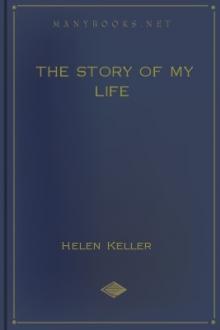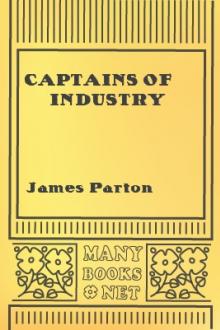The Story of My Life by Helen Keller (good books to read for beginners .txt) 📕

- Author: Helen Keller
- Performer: 0140439153
Book online «The Story of My Life by Helen Keller (good books to read for beginners .txt) 📕». Author Helen Keller
TO MR. JOHN HITZ
12 Newbury Street, Boston,
February 3, 1899.
…I had an exceedingly interesting experience last Monday. A kind friend took me over in the morning to the Boston Art Museum.
She had previously obtained permission from General Loring, Supt.
of the Museum, for me to touch the statues, especially those which represented my old friends in the “Iliad” and “Aeneid.” Was that not lovely? While I was there, General Loring himself came in, and showed me some of the most beautiful statues, among which were the Venus of Medici, the Minerva of the Parthenon, Diana, in her hunting costume, with her hand on the quiver and a doe by her side, and the unfortunate Laocoon and his two little sons, struggling in the fearful coils of two huge serpents, and stretching their arms to the skies with heart-rending cries. I also saw Apollo Belvidere. He had just slain the Python and was standing by a great pillar of rock, extending his graceful hand in triumph over the terrible snake. Oh, he was simply beautiful!
Venus entranced me. She looked as if she had just risen from the foam of the sea, and her loveliness was like a strain of heavenly music. I also saw poor Niobe with her youngest child clinging close to her while she implored the cruel goddess not to kill her last darling. I almost cried, it was all so real and tragic.
General Loring kindly showed me a copy of one of the wonderful bronze doors of the Baptistry of Florence, and I felt of the graceful pillars, resting on the backs of fierce lions. So you see, I had a foretaste of the pleasure which I hope some day to have of visiting Florence. My friend said, she would sometime show me the copies of the marbles brought away by Lord Elgin from the Parthenon. But somehow, I should prefer to see the originals in the place where Genius meant them to remain, not only as a hymn of praise to the gods, but also as a monument of the glory of Greece. It really seems wrong to snatch such sacred things away from the sanctuary of the Past where they belong….
TO MR. WILLIAM WADE
Boston, February 19th, 1899.
Why, bless you, I thought I wrote to you the day after the “Eclogues” arrived, and told you how glad I was to have them!
Perhaps you never got that letter. At any rate, I thank you, dear friend, for taking such a world of trouble for me. You will be glad to hear that the books from England are coming now. I already have the seventh and eighth books of the “Aeneid” and one book of the “Iliad,” all of which is most fortunate, as I have come almost to the end of my embossed textbooks.
It gives me great pleasure to hear how much is being done for the deaf-blind. The more I learn of them, the more kindness I find.
Why, only a little while ago people thought it quite impossible to teach the deaf-blind anything; but no sooner was it proved possible than hundreds of kind, sympathetic hearts were fired with the desire to help them, and now we see how many of those poor, unfortunate persons are being taught to see the beauty and reality of life. Love always finds its way to an imprisoned soul, and leads it out into the world of freedom and intelligence!
As to the two-handed alphabet, I think it is much easier for those who have sight than the manual alphabet; for most of the letters look like the large capitals in books; but I think when it comes to teaching a deaf-blind person to spell, the manual alphabet is much more convenient, and less conspicuous….
TO MRS. LAURENCE HUTTON
12 Newbury Street, Boston,
March 5, 1899.
…I am now sure that I shall be ready for my examinations in June. There is but one cloud in my sky at present; but that is one which casts a dark shadow over my life, and makes me very anxious at times. My teacher’s eyes are no better: indeed, I think they grow more troublesome, though she is very brave and patient, and will not give up. But it is most distressing to me to feel that she is sacrificing her sight for me. I feel as if I ought to give up the idea of going to college altogether: for not all the knowledge in the world could make me happy, if obtained at such a cost. I do wish, Mrs. Hutton, you would try to persuade Teacher to take a rest, and have her eyes treated. She will not listen to me.
I have just had some pictures taken, and if they are good, I would like to send one to Mr. Rogers, if you think he would like to have it. I would like so much to show him in some way how deeply I appreciate all that he is doing for me, and I cannot think of anything better to do.
Every one here is talking about the Sargent pictures. It is a wonderful exhibition of portraits, they say. How I wish I had eyes to see them! How I should delight in their beauty and color!
However, I am glad that I am not debarred from all pleasure in the pictures. I have at least the satisfaction of seeing them through the eyes of my friends, which is a real pleasure. I am so thankful that I can rejoice in the beauties, which my friends gather and put into my hands!
We are all so glad and thankful that Mr. Kipling did not die! I have his “Jungle-Book” in raised print, and what a splendid, refreshing book it is! I cannot help feeling as if I knew its gifted author. What a real, manly, lovable nature his must be!…
TO DR. DAVID H. GREER
12 Newbury Street, Boston,
May 8, 1899.
…Each day brings me all that I can possibly accomplish, and each night brings me rest, and the sweet thought that I am a little nearer to my goal than ever before. My Greek progresses finely. I have finished the ninth book of the “Iliad” and am just beginning the “Odyssey.” I am also reading the “Aeneid” and the “Eclogues.” Some of my friends tell me that I am very foolish to give so much time to Greek and Latin; but I am sure they would not think so, if they realized what a wonderful world of experience and thought Homer and Virgil have opened up to me. I think I shall enjoy the “Odyssey” most of all. The “Iliad” tells of almost nothing but war, and one sometimes wearies of the clash of spears and the din of battle; but the “Odyssey” tells of nobler courage—the courage of a soul sore tried, but steadfast to the end. I often wonder, as I read these splendid poems why, at the same time that Homer’s songs of war fired the Greeks with valor, his songs of manly virtue did not have a stronger influence upon the spiritual life of the people. Perhaps the reason is, that thoughts truly great are like seeds cast into the human mind, and either lie there unnoticed, or are tossed about and played with, like toys, until, grown wise through suffering and experience, a race discovers and cultivates them. Then the world has advanced one step in its heavenward march.
I am working very hard just now. I intend to take my examinations in June, and there is a great deal to be done, before I shall feel ready to meet the ordeal….
You will be glad to hear that my mother, and little sister and brother are coming north to spend this summer with me. We shall all live together in a small cottage on one of the lakes at Wrentham, while my dear teacher takes a much needed rest. She has not had a vacation for twelve years, think of it, and all that time she has been the sunshine of my life. Now her eyes are troubling her a great deal, and we all think she ought to be relieved, for a while, of every care and responsibility. But we shall not be quite separated; we shall see each other every day, I hope. And, when July comes, you can think of me as rowing my dear ones around the lovely lake in the little boat you gave me, the happiest girl in the world!…
TO MRS. LAURENCE HUTTON
[Boston] May 28th [1899].
…We have had a hard day. Mr. Keith was here for three hours this afternoon, pouring a torrent of Latin and Greek into my poor bewildered brain. I really believe he knows more Latin and Greek Grammar than Cicero or Homer ever dreamed of! Cicero is splendid, but his orations are very difficult to translate. I feel ashamed sometimes, when I make that eloquent man say what sounds absurd or insipid; but how is a school-girl to interpret such genius?
Why, I should have to be a Cicero to talk like a Cicero!…
Linnie Haguewood is a deaf-blind girl, one of the many whom Mr.
William Wade has helped. She is being educated by Miss Dora Donald who, at the beginning of her work with her pupil, was supplied by Mr. Hitz, Superintendent of the Volta Bureau, with copies of all documents relating to Miss Sullivan’s work with Miss Keller.
TO MR. WILLIAM WADE
Wrentham, Mass., June 5, 1899.
…Linnie Haguewood’s letter, which you sent me some weeks ago, interested me very much. It seemed to show spontaneity and great sweetness of character. I was a good deal amused by what she said about history. I am sorry she does not enjoy it; but I too feel sometimes how dark, and mysterious and even fearful the history of old peoples, old religions and old forms of government really is.
Well, I must confess, I do not like the sign-language, and I do not think it would be of much use to the deaf-blind. I find it very difficult to follow the rapid motions made by the deaf-mutes, and besides, signs seem a great hindrance to them in acquiring the power of using language easily and freely. Why, I find it hard to understand them sometimes when they spell on their fingers. On the whole, if they cannot be taught articulation, the manual alphabet seems the best and most convenient means of communication. At any rate, I am sure the deaf-blind cannot learn to use signs with any degree of facility.
The other day, I met a deaf Norwegian gentleman, who knows Ragnhild Kaata and her teacher very well, and we had a very interesting conversation about her. He said she was very industrious and happy. She spins, and does a great deal of fancy work, and reads, and leads a pleasant, useful life. Just think, she cannot use the manual alphabet! She reads the lips well, and if she cannot understand a phrase, her friends write it in her hand, and in this way she converses with strangers. I cannot make out anything written in my hand, so you see, Ragnhild has got ahead of me in some things. I do hope I shall see her sometime…
TO MRS. LAURENCE HUTTON
Wrentham, July 29, 1899.
…I passed in all the subjects I offered, and with credit in advanced





Comments (0)